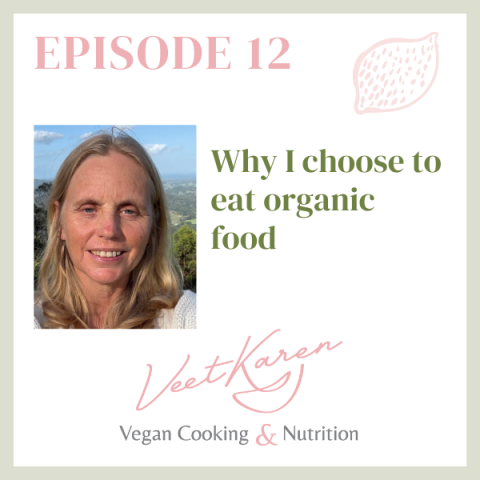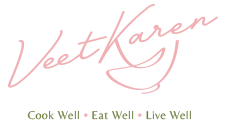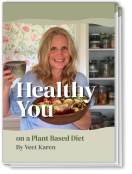
Episode 12
Why I choose to eat organic food
Have you been thinking about eating organic but are confused about whether it's worth paying the extra money? I share with you how to keep the costs down on organic food.
Listen Now
Show Notes and Links
https://www.veets.com.au/vegan-foundation-cooking-course Come join the online group program of the vegan foundation cooking course where we not only ensure the meals, snacks and treats contain iron but also are fully nutritious and taste sensationally delicious.
https://www.veets.com.au/blog/tahini-biscuits tahini biscuits
https://vandanashivamovie.com/ information on Vandhana Shiva
Introduction
Do you buy organic food? Do you eat organic food? Or have you been thinking about buying and eating organic food, but you're pretty confused about whether it's actually worth the money and actually good for you or not? I personally have eaten organic produce for the last 23 years, and I can see clearly the positive benefits to my health.
There is so little scientific evidence on the benefits of organic food, which confuses people a lot.
In this episode of the Vegan Cooking and Nutrition Podcast, I share with you my thoughts and insights into why I believe organic food is much better for you. I'll share with you a summary of the science that I've found on the benefits of eating organic food, plus some tips on how to keep the costs down. For the relevant show notes go to www.veets.com.au/12 and enjoy listening.
My story with eating organic food
Before I met my partner Mak, I was eating organic food here and there but not doing it consistently, so if I saw that there was something that was a lot cheaper that was non-organic, I would buy that instead.
When I met Mak almost 24 years ago, things changed. He'd been an organic farmer in the south of France for four years, farming on land that had never had any chemical farming on it. The person he bought the land from had been farming that land for more than 50 years and he'd been feeding himself and his whole family with the food he grew there.
When Mac and I got together we decided that we would only buy organic food to eat at home. When we would go out to eat, we wouldn't worry about whether it was organic or not because it was really difficult to buy organic food out to eat, which it still is but we would limit the number of times we went out to eat so the vast majority of our food was organic.
The reason I had been considering organic before I met Mak is that I grew up with my mum talking about her father, my grandpa, who grew vegetables for the entire family on his allotment in England. They didn't have enough land in their yard to grow vegetables, so he rented a plot of land, which was called an allotment, similar to our community gardens today.
My grandpa grew his food for his whole family. They didn't have to buy vegetables, so he just grew the most beautiful food and my grandma preserved it for the winter months. My mum also dabbled in gardening for a year when I was growing up and the food that she produced in that little garden was the best I'd ever tasted. I loved the idea that you could grow food without dousing it in chemicals.
At university, I studied primary school teaching and majored in science. It's pretty funny because I'm not at all scientific, but I love science. In my major, I looked at how food was produced and it made absolutely no sense to me that they were using chemicals to grow food. Where did those chemicals go? I always wondered, and then I got confirmation from my uncle, who was a farmer and used chemicals in his farming, that there was no point in washing the vegetables and fruit as the chemicals were systemic, and it wouldn’t get them off.
The history of chemical farming
And then, in 2012, I had the honour of cooking for Vandana Shiva. And if you don't know who Vandana Shiva is, take a look. She presented at a festival that she was attending and spoke about the information that she found about why organic food was being used. It made me super glad that Mak and I decided to only eat organic food and really solidified that that's what I was going to do for the rest of my life.
I'd been in India a lot and been around when they were spraying DDT over the crops and also into the streets to eradicate mosquitoes. It was horrendous, it smelled bad and it always resulted in nosebleeds for me and made me feel really ill for days. I'd often get a throat infection and I could see that there was something very wrong with this type of farming.
I also knew, like most people, that DDT was used in chemical warfare. So the maths started adding up and then, when I heard Vandana Shiva talk about the companies that had supplied ammunition in World War II, they had made so much money from supplying that ammunition that when it came to the end of World War II they were looking around for another way of making money and they decided to use it in farming.
Now, some of you listening may think that this is all conspiracy, but when you go to any mainstream site advocating for non-organic farming, or you look up the history of non-organic farming, you will see plainly there on so many different sites that chemical farming started at the end of World War II. They state on the sites that there was a worldwide shortage of vegetables and a new way of farming was needed for this to make sure that people could get their food. Then they go on to write that there was a leftover of ammonium nitrate and poison gases from the war that could be used for farming.
This had alarm bells ringing for me all over the place. I know after World War II that my grandpa was still growing amazing veggies, feeding his family, as were all the people in the allotments next to him in England. I know that my uncle's grandfather in the States still grew all his own produce after the war. I know that my ex-husband's family in Italy grew all their produce in their gardens without using chemicals after the war. So those families were getting vegetables and fruit to eat.
Now, I'll ask you this question. Was it really a world food shortage that brought in chemical farming, or was it companies needing to find a way to continue making money? Or was it a combination of both? It also makes me wonder why DDT was used. DDT was used in World War II to eradicate mosquitoes that were carrying typhus and malaria. In 1945, just after World War II, it was introduced in the states to eradicate pests when growing large-scale crops.
The negatives of chemical farming
Regardless of why chemical farming came into use, there are some known documented negatives on why chemical farming is not good for you. However, there is only a small amount of scientific evidence on the benefits of organic produce, there needs to be more long-term studies done on this before we can really find out the impacts of chemical farming.
Why I choose to eat organic food
For me personally, number 1, I eat organic produce because I know I will get more nutrients.
Number two, I'm susceptible to any artificial chemical and it does weaken my immune system. The DDT spraying in India is a very good example of that.
Number three is, I love to support local growers who are growing organic produce. I think this is really important for our economy.
Number four, I'm concerned what the chemicals do to the rest of the environment.
Number five, I like the taste of organic food. Now sometimes organic food doesn't taste great. Most of the time organic food tastes amazing.
The difference between ammonium nitrate and nitrogen
Before I go on to the evidence that I found on the benefits of organic farming I want to go back a step. I mentioned earlier that ammonium is used in chemical farming. There was excess ammonium nitrate left over at the end of World War two. In the war this was used to make explosives.
If you've done any gardening, you're probably thinking, 'isn't nitrogen good for the soil?' So yes, we actually do need naturally occurring nitrogen in the soil to grow healthy food. What I do to put nitrogen in my soil is I plant plants that are high in nitrogen, for example pigeon peas and comfrey. I also make compost from my kitchen scraps and that helps with the nitrogen balance.
There is a known risk from using ammonium nitrate and that's on all the bottles of ammonium nitrate, especially in the handling and storage process. You can develop lung issues and chronic respiratory disease, all bottles of ammonium nitrate come with a warning as overuse can deplete oxygen in water bodies and create dead zones in those water bodies. So that means in those water bodies, no fish or other aquatic creatures can live there. So that in itself is enough reason why I don't want to put that on my food.
Organic food is higher in nutrients
Studies have shown that the antioxidant level can be up to 67% higher in foods that are organic and that's why some people who are battling with cancer, or they're preventing cancer, or they've had cancer, choose to eat organic.
Vitamin C and iron sources are also higher in organic food. ne study showed that organic food was 52% higher in vitamin C than non-organic food.
Another study showed that people need to eat an extra one to two portions of conventional fruit or vegetables to get the same amount of antioxidants compared to organic fruit and veg.
High Levels of nitrate are related to risks of some cancers
Another study showed that organic food contained 30% less nitrate. High levels of nitrate are associated with some risks of some cancers. High levels of nitrate are also associated with methemoglobinemia which can lead to heart arrhythmia and in infants it can affect the body's ability to carry oxygen.
Another study showed that cadmium was 40% lower in organic food. When there's a build-up of cadmium in the body, it can cause gastronomical bleeding and necrosis, which is the death of tissues in the liver and kidney. It can actually kill the liver and kidney. The same study also showed that the cadmium level in people that were eating conventional food was below the safety limit for cadmium. So that study wasn't conclusive.
More antioxidants in organic food
The benefits of organic food can be that they can protect cells from damage as there is more antioxidant content. The more antioxidants in our body, the less chance of cancer.
Organic food can reduce weight gain
Organic food reduces weight gain because you're eating less food there are more nutrients in organic food.
Can develop a stronger immune system and a lower risk of allergies and lower risk of preeclampsia
Organic food can develop a stronger immune system and may lower the risk of allergies. A meta-analysis showed significant differences between organic and conventional farming that had high antioxidants, lower cadmium and pesticides levels and surprisingly, a higher omega-3 content. That study also showed that it reduced the risk of pre-eclampsia, which if you don't know, is a serious blood condition during pregnancy.
But the cost of it…….
Even though there's only a small amount of scientific evidence, it's enough for me. Like I've said over and over again, I guess you get the picture that I eat organic and I'm an advocate for organic food. But let's get to the nitty-gritty of it, the cost.
The cost is really something that puts people off eating organic food. And I get it. Food is already super expensive without the added cost that comes with organic food. A vet once told me that he sees fewer issues in the pets that come in which are on an organic diet. The owners end up spending less money with him than the people who come in with their pets that are not on an organic diet. I relate that to humans, too.
I'd rather spend my money on buying organic food and zero on supplements and doctor's bills. In a way, organic food can actually work out cheaper if you do the maths over years. And then from that scientific evidence, I told you that you need to eat less fruit and veg to get the same amount of nutrients if you're eating organic. That's another way to keep the costs down.
If you buy packaged goods like sauces and small packs of rice of conventional food, and then you compare that to the cost of organic buying in bulk, there's not that much difference in price. So if you buy bulk organic and you just buy what you need, there might not actually be that much difference.
Last year in October, I did this, as I do every five years or so, just to make sure that I'm still on track with this information. I compared a week's worth of shopping for Mak and I from the pricing point of vew. All organic from our local health food shop which is Fresh, what I could buy at Coles conventionally, the same amounts in the packets. The difference was the organic bill was $21 more than the conventional bill.
$21 more for two people, that's $10.50 each week, so for me that's a no-brainer. I can find an extra $10.50 a week and buy organic food.
It’s a very interesting comparison but it means you need to buy less packaged food. Cook more from scratch.
Tips on how to keep the cost of organic food down
1. Buy exactly what you need and no more. Especially with fruit and veg, don't get hooked into buying a bag of zucchinis because for two people you only need two zucchinis at the most a week. If you buy a bag of zucchinis then they're going to rot and you waste money.
2. Always buy bulk items like rice, flour, spices, etc. Never buy them in pre-packaged bags and again just buy what you need.
3. Another way to keep the cost down is making your own staples. So you can make your own cashew cheese, it's half the price of buying it. You can make your own tomato sauce, it's half the price of buying it. Curry paste, half the price of buying it. All of those things, hummus, pesto, make it yourself.
That's why in the vegan foundation cooking course I teach cooking things from scratch and I find ways to do that without taking up too much time, so that you've always got your hummus, you've always got your butter, you've always got your cheeses, in the fridge or freezer
You learn to make your own things like biscuits and crackers, they are going to be cheaper and better if you make them yourself rather than buying a packet.
Recipe
Tahini Biscuits
You can make these with peanut butter too.
For the recipe head on over to
https://www.veets.com.au/blog/tahini-biscuits
FCT (fun cooking tip)
If you haven't already got a lettuce spinner and you've got some extra funds buy one, because lettuce spinners are a really good way of washing organic vegetables. A lot of organic vegetables sometimes come with bugs, especially in herbs, lettuce and leafy greens.
What I do is, I put everything in the lettuce spinner, fill it up with water and then I pull out the strainer bit so I can see how much dirt is in the water and if there's any bugs, I can rescue them, pop them in my compost. If the water is clean that's great, if it's not I give it another rinse, especially with things like spinach, kale and chard, they need a really good wash, sometimes three times, depending on where you live.
Over in WA with the sand they need three washes for sure.
We have been through a few lettuce spinners because sometimes people drop them they crack or sometimes they're banged hard and they'll crack and it's such a waste of plastic it breaks my heart to have to put it into the recycling bin.
Mak bought meone from OXO. I'm not an affiliate with OXO but OXO use a very strong plastic that is thick. We have had our herb spinner from them for four years. It's been dropped and it hasn't cracked. It's fantastic. So that's a great tip on a brand there. Also they now make a stainless steel one.
Yay, thank you for listening, please like share and subscrib, write a comment that will just really help me get this podcast out further.
Have a wonderful time until I'm next delivering a podcast to you.
Bye for now !




